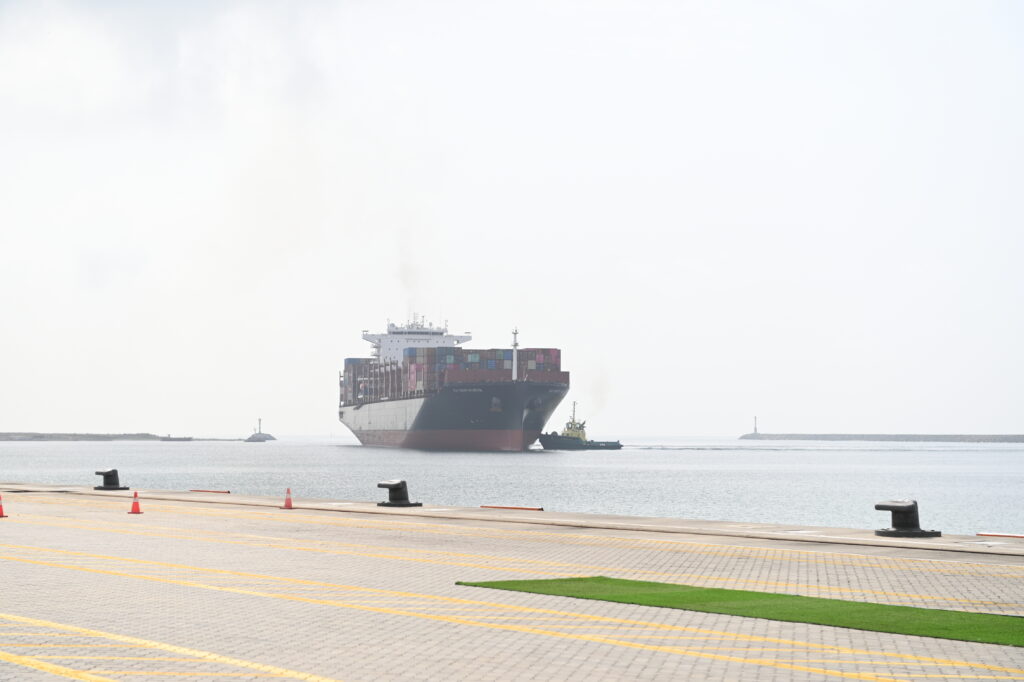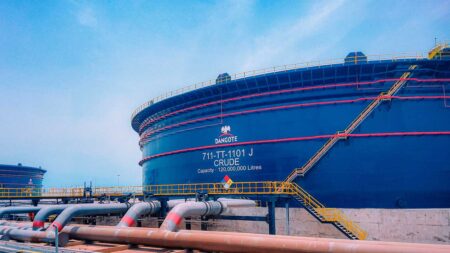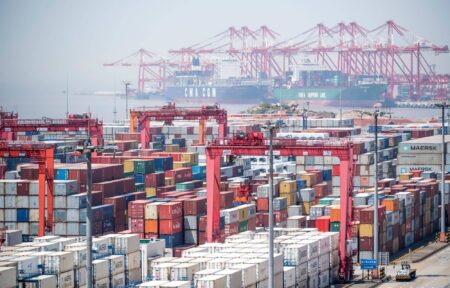- Lekki Deep Sea Port can now accommodate vessels with up to 7,000 TEUs (Twenty-foot Equivalent Units).
- Port’s ability to handle larger cargo volumes makes Nigeria a key gateway for goods entering and leaving West Africa.
- Lekki Port taps into global best practices in maritime logistics and safety standards.
Nigeria’s maritime industry has received a timely boost with the launch of the COSCO, Singapore headquarted ONE (Ocean Network Express), and ZIM alliance services at Nigeria’s Lekki Deep Sea Port last week.
This initiative not only enhances Africa’s biggest economy’s connectivity to global trade routes but also promises to stimulate economic growth by attracting foreign investment, increasing trade capacity, and fostering efficiency in logistics.
Expanding capacity of Nigeria’s maritime trade
The arrival of the E A Centaurus, the largest COSCO vessel to dock in Nigeria, is a pointer to the heightened capacity of Lekki Deep Sea Port, which now accommodates vessels with up to 7,000 TEUs (Twenty-foot Equivalent Units).
This expansion enables Lekki Port to handle larger cargo volumes and opens new trade routes, making Nigeria a pivotal gateway for goods entering and leaving West Africa.
Christophe Cassang, CEO of Lekki Freeport Terminal, underscored this milestone as part of the company’s vision to establish a premier maritime trade hub. He noted that the infrastructure and technology investments at the port are designed to keep pace with future trade demands, ensuring that the terminal meets the evolving needs of global shipping lines and their customers.
With the start of bi-weekly calls by COSCO, ONE, and ZIM shipping lines, Lekki Port is positioned to support significant increases in cargo volumes, transforming Nigeria into a logistics center for the entire region.
Strategic partnerships fueling economic growth
The strategic alliances with COSCO, ONE, and ZIM have strengthened Nigeria’s position on the global stage. This partnership not only brings international expertise to Nigeria’s shores but also showcases the port’s capacity to meet the high standards expected by global shipping giants. By collaborating with international trailblazers, Lekki Port taps into global best practices in maritime logistics and safety standards, thereby enhancing the credibility and attractiveness of Nigeria’s ports.
Adesuwa Ladoja, CEO of Lagos Free Zone, highlighted the impact on foreign direct investment (FDI), stating that the introduction of multiple shipping lines is expected to draw more investors to Lagos Free Zone.
These developments provide investors with improved logistical options, enabling them to streamline their supply chains by bringing raw materials directly to their factories within the free zone and exporting finished goods efficiently. This integration of industrial and port facilities is a big win for industries looking to establish a strong foothold in West Africa.
A boost to Nigerian manufacturing and exports
The launch of these shipping services aligns well with Nigeria’s push to diversify its economy and reduce reliance on oil exports. By providing efficient, high-capacity logistics options, Lekki Port facilitates local manufacturers’ ability to import raw materials and export finished goods with ease.
This is particularly valuable for industries within the Lagos Free Zone, which houses global brands such as Kellogg’s, Colgate, and BASF. The enhanced shipping capacity gives these companies a competitive edge in both sourcing materials and distributing products across Africa and beyond.
Additionally, the port’s capabilities in automation and digitalization optimize cargo handling, which is essential for time-sensitive industries. For instance, Nigerian agribusinesses can now export perishable goods more reliably, while other manufacturers benefit from reduced costs and quicker turnaround times.
This efficiency directly contributes to Nigeria’s economic growth by creating jobs, improving trade balance, and fostering innovation in the local industrial sector.

(Source: Lagos Free Zone (LFZ)
Regional Connectivity: Positioning Nigeria as a logistics hub
The establishment of a modern, deep-water port at Lekki strengthens Nigeria’s appeal as a regional logistics hub. As the deepest seaport in Nigeria, with a 16.5-meter draft, Lekki Port can host larger vessels that are unable to access other regional ports.
This advantage opens up West Africa to a broader array of international trade routes, facilitating the movement of goods to neighboring landlocked countries, such as Niger and Chad, which rely on Nigerian ports for imports and exports.
This development is anticipated to decrease dependency on older ports, such as Apapa and Tin Can Island, which have faced issues of congestion and limited capacity. The new port alleviates these bottlenecks and provides additional trade routes, thereby reducing shipping times and costs for importers and exporters throughout West Africa.
Additionally, as neighbouring countries seek efficient ports to expedite their trade processes, Nigeria stands to gain revenue from transit fees and related services.
Technology enhancing efficiency at Lekki Port
Lekki Port’s commitment to adopting advanced technology positions it as a forward-looking facility equipped to handle the complexities of modern trade. The port leverages automated systems to streamline vessel berthing and cargo handling, which minimizes delays and boosts productivity.
This focus on technology not only ensures faster processing times, but also enhances safety protocols, a critical aspect for shipping lines operating at high standards.
These technological advancements are aligned with global trends in the maritime industry, where ports increasingly rely on automation and data-driven solutions to manage growing cargo volumes. By embracing such innovations, Lekki Port sets a benchmark for other African ports, potentially influencing modernization efforts across the continent.
This competitive edge may attract additional shipping lines looking for efficient and reliable ports within Africa, further solidifying Lekki Port’s status as a central player in the regional trade network.
Sustainable growth and long-term impact on Nigeria’s economy
Beyond immediate trade benefits, the establishment of a modern port at Lekki holds long-term implications for Nigeria’s economy. Increased cargo throughput contributes to the broader economy by creating jobs within the maritime, logistics, and manufacturing sectors.
Additionally, enhanced trade capabilities can reduce the costs of imports, benefiting Nigerian consumers and industries alike.
The increased FDI generated by these advancements has a multiplier effect, supporting infrastructure improvements, skill development, and the expansion of ancillary services such as warehousing and transportation. Over time, this ecosystem can transform Nigeria’s coastal regions into vibrant economic zones that drive national growth and development.
Du Ruogang, Managing Director of Lekki Port, noted that the launch of the new shipping lines represents just the beginning of Lekki Port’s mission to support the Nigerian economy. He envisions the port as a linchpin in Nigeria’s logistics and trade strategy, with potential impacts reaching far beyond the maritime sector.
Charting a new course for Nigeria’s maritime future
The inauguration of COSCO, ONE, and ZIM services at Lekki Deep Sea Port is a landmark for Nigeria’s maritime sector. By bolstering trade capacity, fostering international partnerships, and driving economic development, Lekki Port has set Nigeria on a path toward becoming a key hub for West African trade.
This development not only enhances Nigeria’s global competitiveness but also builds a resilient foundation for long-term economic progress.
As Nigeria continues to expand its trade and industrial capacity, Lekki Port’s role will be pivotal in shaping the future of regional logistics. This shipping line alliance marks a significant stride in Nigeria’s journey to redefine its maritime landscape, bridging trade gaps, and unlocking economic potential for future generations.
Read also: Nigeria’s output dips fastest in 19 months on a sharp rise in costs











